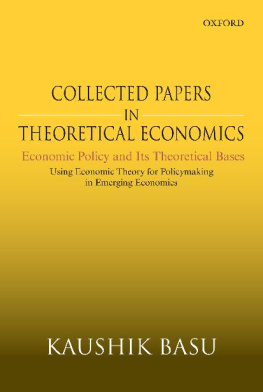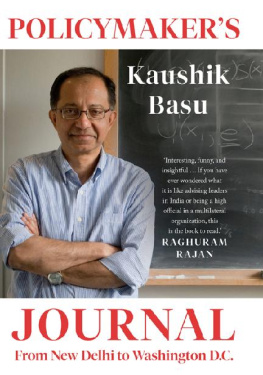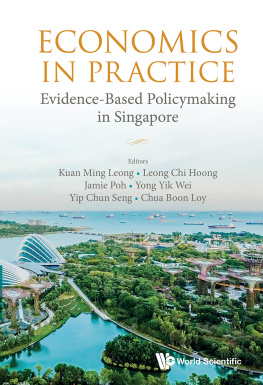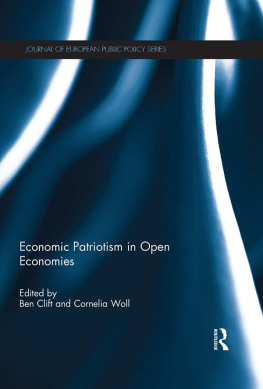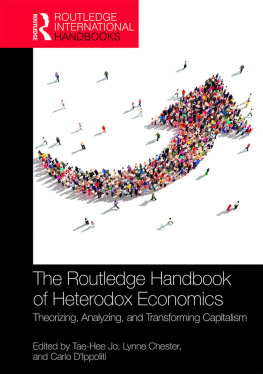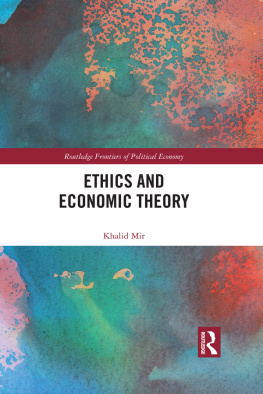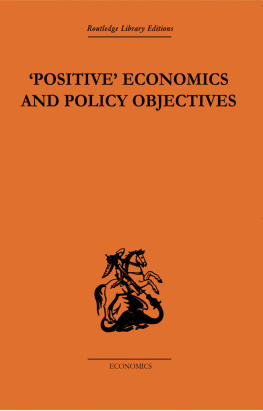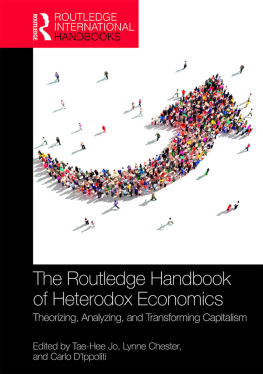Economic Policy and Its Theoretical Bases
Collected Papers in Theoretical Economics
Volume V
Economic Policy and Its Theoretical Bases
Using Economic Theory for Policymaking in Emerging Economies
Kaushik Basu
Oxford University Press is a department of the University of Oxford.
It furthers the Universitys objective of excellence in research, scholarship,
and education by publishing worldwide. Oxford is a registered trademark of
Oxford University Press in the UK and in certain other countries.
Published in India by
Oxford University Press
2/11 Ground Floor, Ansari Road, Daryaganj, New Delhi 110 002, India
Oxford University Press 2018
The moral rights of the authors have been asserted.
First Edition published in 2018
All rights reserved. No part of this publication may be reproduced, stored in
a retrieval system, or transmitted, in any form or by any means, without the
prior permission in writing of Oxford University Press, or as expressly permitted
by law, by licence, or under terms agreed with the appropriate reprographics
rights organization. Enquiries concerning reproduction outside the scope of the
above should be sent to the Rights Department, Oxford University Press, at the
address above.
You must not circulate this work in any other form
and you must impose this same condition on any acquirer.
ISBN-13 (print edition): 978-0-19-948881-0
ISBN-10 (print edition): 0-19-948881-9
ISBN-13 (eBook): 978-0-19-909381-6
ISBN-10 (eBook): 0-19-909381-4
Typeset in Adobe Garamond Pro 10.5/12.3
by Tranistics Data Technologies, Kolkata 700091
Printed in India by Replika Press Pvt. Ltd
Contents
Tables
Figures
1.1 By Way of Preface
There is often a presumption that the economics that underlies policymaking is empirical, and stands quite apart from economic theory. While that is indeed generally the case since policymaking usually relies on data, statistics, and the regularities observed therein, it is folly to think of this as an inviolable norm. For policies to be effective we also need to ground them in analytics, deductive reasoning, and logic, which are the constituents of theory. Economic theory began with Smith, Ricardo, Cournot, Mill, Walras; and came into its own in our time with contributions from Hicks, Arrow, Samuelson, Sen, and Nash, among others. I am aware I am omitting names but I want to give the reader a flavour of the range and diversity of the contributors who made modern economics what it is today. This book is a collection of my papers which all have a direct bearing on economic policymaking, and, at the same time, belong to the broad tradition of economic theory, drawing on ideas, concepts, and theorems developed by the aforementioned economists and many others.
There is little surprise that all the papers in this volume were published during the seven years, 200916, that I spent as policymaker, first as chief economic adviser to the Indian government and then as chief economist of the World Bank. During these years my interest and focus were entirely directed to making policy. I was drawing on a lot of work done by empirical economists but I could not shed my own training and interest in economic theory and so the few papers that I published during these years were policy papers but ones that drew on economic theory, including some of my own earlier papers. As such, all the papers included in this collection are rooted in analytics, even while addressing practical, down-to-earth problems, such as the global crisis, Indias inflation management, sub-prime mortgage breakdown, the control of corruption, and the economics of food grain management.
My interest in policy dates back to much before I actively entered the world of policymaking in 2009. It began with my foray into economic journalism, in 1982, when I started writing a column called Economic Graffiti for The Indian Express . I would later write for India Today , BBC Online, some op-eds for New York Times , and other newspapers and magazines. Given that most of my research was on economic theory and applied theory, this writing on the side was extremely valuable as a window to the world. This was the reason why, when I eventually did go into policymaking, it was a shock, but not as big as it might have been otherwise.
There are a large number of papers in this volume on global economic challenges. This reflects mainly the changing nature of the world. Some of the early chief economic advisers to the Indian government tell me that their main concern would be with Indias internal economythe inflation rate, GDP growth, industrialization, banking, and so forth. By the time I took on the job, those concerns were still there but we were continually scouring the global economy because the world was linked up enough by then that a major crisis in the Eurozone or the U.S. or China would wash up ashore in India in no time. And there were many major crises. The Lehman collapse had occurred in the U.S. in 2008 and by the time I joined the Indian government the following year, its impact was palpable in India. A few years into my job in India, the sovereign debt problem in the Eurozone area became a full-fledged crisis. During my nearly three years in the government, I used to lead the Indian team for G-20s Mutual Assessment Process or MAP meetings, and India and Canada were the joint chairs for this work. This responsibility ensured that I had to be engaged with the global economy and that is reflected in what I wrote during those years and the choice of essays included in this book.
I was then flirting with ideas which I would later pick up, such as in the paper that Joseph Stiglitz and I wrote, investigating the economic consequences of the provisions of the Lisbon Treaty, and its predecessor, the Maastricht Treaty, that underlie the creation of the European Union, and finding some of them wanting.
Given this broad coverage, and the fact that the book is at the same time almost an introduction to basic economics in the real world, I hope it will be of interest to students of economics, economic journalists, and policymakers in charge of designing and implementing interventions.
My recent book, An Economist in the Real World: The Art of Policymaking in India , may be viewed as a companion to this volume. Students of economics, who want to read up some of the economic theory underlying the aforementioned book, will find this collection of papers to be a useful companion.
There are many people who have contributed to this book. It was the cadre of the Indian Economic Service that provided me with critical support when I first went into policy work. I am grateful to this talented and committed group that initiated me into the world of policymaking. At the World Bank, the equivalent group would be the staff of the Development Economics Unit, or DEC. They helped me with my routine work and also helpfully took away some of it from my hands, thereby making it possible for me to do the little research that I did during my four years at the World Bank.

